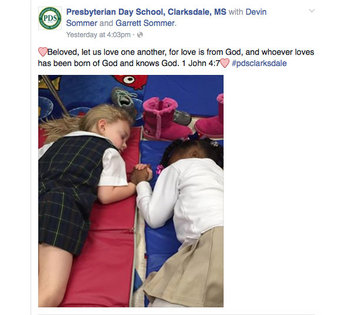 Have you seen this picture? It was shared by the Presbyterian Day School in Clarksdale, MS and has gone viral this past week. While some view it as a positive commentary on race relations, a representative with the school said they want the focus to remain on the love of Jesus Christ, as captioned in the picture. This brings up a vital question that, I think, as believers in Jesus, it is crucial that we ponder: What is going to improve race relations in our country? Is it just going to happen because as a society we are moving forward and the bigots and racist will eventually die out, or do we actually have to do something to bring it about? Recently, when I taught on God’s kingdom and the responsibility of the church to live according to its values, a kind older gentlemen asked me a version of this question. He shared what he saw in his neighborhood: scenes like those captured in the photo, children of different races playing together, which were non-existent in his youth. He asked me if I didn’t think things would just keep getting better and better until the day racial issues would simply disappear. His question implied that we need not bother ourselves with actively working against such issues, we need only wait. That’s the question isn’t it? Are things such as institutional racism, bigotry, and hatred simply going to disappear? Are we improving as a society? Will the world of Star Trek one day become reality? It is true we no longer have slavery and legalized segregation. But let’s remember how those changes came about. They did not happen because society simply improved. They were paid with the sacrifice and lives of thousands of people. They were fought for and, sometimes, wrenched from the hands of those who were holding on to them with radical fervency. The bigger question is whether the Christian worldview is one of a progressive future or one that calls for individual and societal responsibility? Well, when you put it that way, the answer is very clear isn’t it. Jesus himself spoke of the future, not as a utopia, but as a time when “the love of many would wax cold” and the world would be filled with ethnic strife, nation rising up against nation. As Christians we are called to “seek first his kingdom and His righteousness”. In other words, we are called to desire and pursue God’s authority in this world and his way of doing things. I think we can see in this a call to work for justice and equity. Not to bring about a utopia here on the earth, but to testify to the character of the God we serve. It’s funny to me that we conservative, Evangelical Christians are all about personal responsibility when it comes to most issues. There are many among us who see poverty, for example, primarily a result of personal choices and not a consequence of larger societal issues. Yet, when it comes to racial issues, we are tempted to put our trust in society and abdicate our own accountability in the matter. Could it be we are quick to blame but slow to work? Brothers and sisters, this should not be. Those of us who are called, literally by Christ's title — anointed one — should be the ones on the front lines of manifesting Christ’s love, heart, and character to the world around us. So I agree with the Presbyterian Day School, the picture is all about the love of Christ, for only His love lived out in real action can heal the racial wounds in individual hearts and in our society as a whole. This is the kingdom of God. Comments are closed.
|
Categories
All
Contributing Authors
|

 RSS Feed
RSS Feed